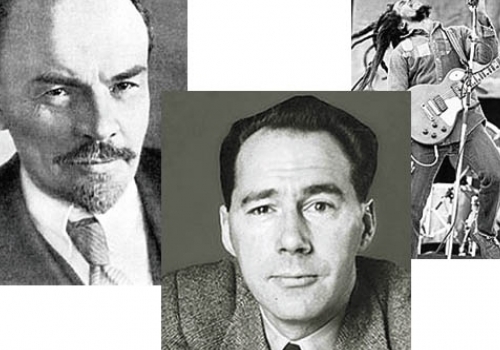Home >> News >> 2012 >> Mar >> Minutes of English Heritage blue plaque panel meetings reveal how proposal to commemorate Lenin was rejected
Minutes of English Heritage blue plaque panel meetings reveal how proposal to commemorate Lenin was rejected

Pictured above, from left, are Vladimir Lenin, John Wyndham and Bob Marley
Published: 29 March, 2012
by RICHARD OSLEY
ENGLISH Heritage has turned down a slew of proposals for its blue plaque scheme involving people who spent time in Camden, including applications to honour journalist James Cameron, The Day Of The Triffids author John Wyndham and Russian revolutionary Vladimir Ilyich Lenin.
The New Journal revealed last week how a proposal to commemorate reggae star Bob Marley’s stay in Ridgmount Gardens, Bloomsbury, with a blue plaque was turned down by the conservation body.
Its series of plaques is considered the most prestigious in the United Kingdom although English Heritage have often warned that it only has funds to erect around 12 to 15 every year – meaning some proposers will be disappointed.
Some celebrities are instead marked with plaques from charities or fanclubs.
Minutes stretching back over the past two years and detailing the work of English Heritage’s blue plaque panel show a host of other suggestions have also been knocked back in private meetings.
Norman Warne, the man who published Beatrix Potter’s Peter Rabbit books, and spent time in Bloomsbury, was also moved on to the “not shortlisted” pile.
And the panel also said no to applications to honour international soprano Jennifer Vyvyan who lived in Hampstead, Labour politician Tony Crosland, who spent time in Highgate, Primrose Hill writer and archaeologist Jacquetta Hawkes, wife of JB Priestley, and celebrated artist Josef Herman, who lived in Camden.
The founders of the famous Foyle’s bookshop in Charing Cross Road – William and Gilbert Foyle – were also snubbed.
The panel said putting a plaque on the bookshop would be “superfluous”.
There is no reason given in the minutes as to why James Cameron, who lived in Chalk Farm, was turned down.
English Heritage’s guidelines say that people the plaques are awarded to should have been dead for at least 20 years so their contribution can be fully appreciated.
Mr Cameron, one of the founding members of CND, died in 1985.
An annual memorial lecture is still given in his name at City University every year and he is held in high regard in journalistic circles.
John Wyndham lived at The Penn Club in Bloomsbury at one stage in his life.
Despite the enduring popularity of The Day Of The Triffids and other science fiction fantasies, there was no plaque for him.
The documents shown to the New Journal show how Lenin’s stay at Tavistock Place was not considered momentous enough for a plaque.
“His connection to this building was too brief to warrant commemoration,” the minutes said.
Professor Christopher Read, an expert from Warwick University, told the New Journal that he disagreed: “It is certainly the case that Lenin only stayed for a relatively short time in London but it was a very important time for several reasons – his personal prominence as one of the major figures of the 20th century, the fact he came to Britain because Germany was less open in its press laws, and the significance of the Second Party Congress, which concluded in London after fleeing Brussels because London was less supportive of Russian police who were spying on it.
“The Congress took crucial decisions as a result of which the Bolshevik movement was born.
"This should mean a blue plaque, as it was a very important moment in 20th-century history and other sites associated with this moment have, I believe, been destroyed.”
The panel also rejected the Marx Memorial Library in Islington which is home to a desk used by Lenin.
English Heritage said the limitations on the number of plaques it erects means the panel has to be “rigorous” and “only recommend the most outstanding historical figures”.
JOHN GULLIVER: 'What a scandal that there's no plaque for this giant of the Press' (click here)




Comments
Post new comment